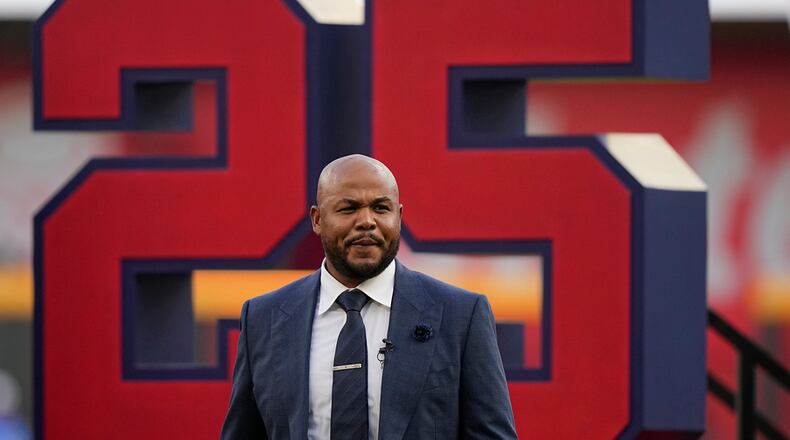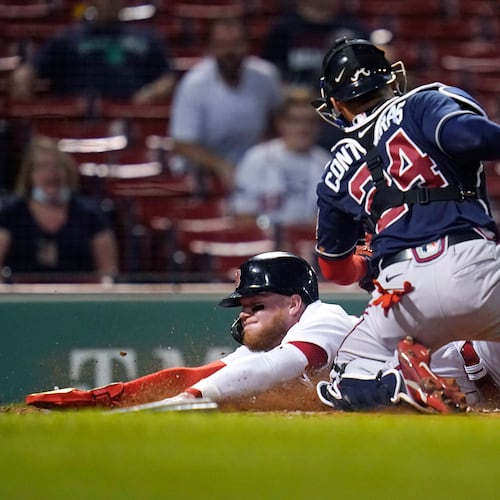Former Braves center fielder Andruw Jones fell short of Hall of Fame election again during his seventh year on the ballot, though he continues to trend upward.
Jones appeared on 61.6% of ballots, an increase from his 58.1% in 2023. A player needs to appear on at least 75% of BBWAA ballots to be elected (289 of 385 ballots). The increased emphasis on defensive metrics has aided Jones’ rise, and he has three more years of eligibility on the ballot.
Third baseman Adrian Beltre (95.1%) and catcher Joe Mauer (76.1%) officially became first-ballot Hall of Famers. First baseman Todd Helton (79.7%) was elected in his sixth year. The trio will join manager Jim Leyland in Cooperstown, New York, for induction in July.
Two other former Braves didn’t reach the threshold: outfielder Gary Sheffield (63.9% on his final year on the ballot) and closer Billy Wagner, who came only five votes short of election (73.8%).
Jones is one of the more beloved players in Braves history. He was best known for his generational defense that put him among the great center fielders in history. He spent 12 seasons with the Braves (1996-2007), slashing .263/.342/.497 with 368 homers, 330 doubles and 1,117 RBIs. His 61 bWAR is the fourth highest in Braves history behind Hank Aaron (142.5), Eddie Mathews (94) and Chipper Jones (85.3), all of whom are in the Hall of Fame.
In 2005, Jones enjoyed his most prolific offensive season, hitting a franchise-record 51 home runs (a high mark that stood until Matt Olson hit 54 last season). His 435 career homers rank fifth among all center fielders. Still, Jones’ defense was his calling card. He won 10 consecutive Gold Gloves (1998-2007). He’s the all-time leader in defensive runs saved and defensive WAR by an outfielder.
The Braves retired Jones’ No. 25 in September. His Hall of Fame teammates lauded him and expressed hope that he eventually would join them in baseball immortality.
Braves Hall of Famer John Smoltz called Jones “the greatest center fielder I’ve ever seen play the game” during the jersey retirement ceremony. Fellow Hall of Famer Tom Glavine added: “When you’re in the conversation as the greatest of all-time to play the position of center field, with a guy like Willie Mays, I think that says a lot.”
This was Wagner’s ninth time on the ballot, meaning he has one year remaining. After coming so close this time, Wagner might finally break through in the next cycle.
Wagner had a 2.31 ERA with 422 saves over 16 seasons (nine with Houston). The Virginia native pitched his final season with the Braves in 2010. Then 38 years old, Wagner had a 1.43 ERA – his lowest in a full season – with 37 saves over 71 games. He was an All-Star, and the Braves won 91 games, making the postseason (as the wild card) for the first time since their 14-year run as division champs ended in 2006.
Sheffield, however, just had his 10th and final year on the ballot. His candidacy goes to the BBWAA’s Historical Overview Committee in 2025, which creates the ballots for the Era Committee to consider for 2026.
Sheffield hit 509 homers with 1,676 RBIs over 22 seasons, earning nine All-Star nods and six top-10 MVP finishes. He had admitted to involvement in the BALCO scandal and using testosterone-enhancing steroids, which obviously hindered his case in many voters’ eyes.
During his two seasons with the Braves (2002-03), Sheffield hit .319/.412/.562 with 64 home runs and 216 RBIs. Both teams won 101 games, with the 2003 club among the more dominant at the plate in franchise history.
The ‘90s and early 2000s Braves are well represented in Cooperstown. Hall of Famers from that run are manager Bobby Cox (elected in 2014), starting pitchers Glavine and Greg Maddux (2014), Smoltz (2015), general manager John Schuerholz (2017), Jones (2018) and first baseman Fred McGriff (2023).
About the Author
Keep Reading
The Latest
Featured



